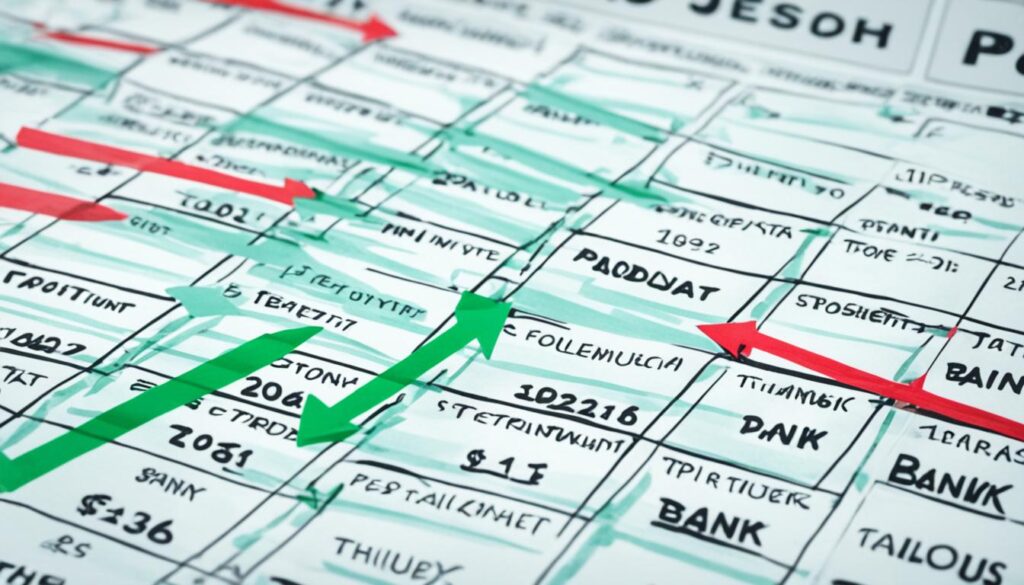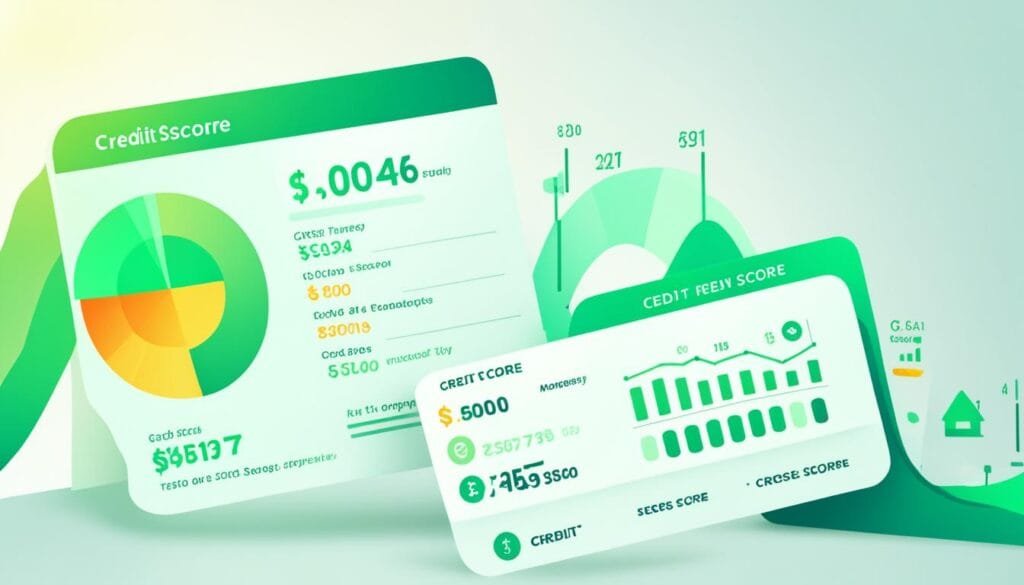Paying bills on time is crucial for maintaining good financial health and avoiding late fees and penalties. Timely bill payments demonstrate financial responsibility and help ensure smooth cash flow management. Whether it’s bill payments for utilities, credit cards, or loan obligations, staying organized and implementing effective strategies can make all the difference.
In this article, we will provide you with valuable tips and strategies to help you stay on top of your bills and ensure on-time payments. By following these strategies, you can reduce stress, save money, and maintain a positive credit history.
Key Takeaways:
- Create a comprehensive list of all your bills to track payment obligations.
- Organize your due dates and consider adjusting them to consolidate payments.
- Take advantage of automated payment options for fixed amount bills.
- Establish a regular bill-paying routine to develop a habit.
- Understand the grace periods and flexibility in due dates provided by your creditors.
Make a List of Your Bills
To stay organized and ensure timely payments, it’s important to create a comprehensive list of all your bills. This bill list will help you track your recurring obligations and stay on top of your financial responsibilities. Include the following details for each bill:
- Lender or service provider
- Minimum monthly payment
- Total balance due
Take the time to gather information about all your bills, including utilities, credit cards, rent or mortgage payments, loan payments, and any other regular expenses. By having a clear overview of your financial obligations, you can prioritize your bill payments effectively.
Example Bill List
| Bill | Minimum Monthly Payment | Total Balance Due |
|---|---|---|
| Electricity | $80 | $300 |
| Mobile Phone | $50 | $200 |
| Credit Card | $100 | $500 |
| Rent | $1,000 | $10,000 |
The bill list helps bring clarity to your financial obligations and provides a visual representation of your recurring expenses. Refer to this list regularly, update it as needed, and make informed decisions about your budget and payment priorities.
Organize Your Due Dates
One of the key strategies for ensuring timely bill payments is to organize your due dates effectively. By keeping track of when each bill is due and organizing them accordingly, you can avoid missing payments and incurring late fees. Here are some steps to help you streamline your payment schedule:
- Take note of due dates: Start by identifying the due dates for all your bills. This could include credit card payments, utility bills, rent or mortgage payments, and any other recurring financial obligations.
- Consolidate payment dates: Consider tweaking due dates to consolidate your payments. By aligning bill due dates, you can simplify your payment schedule and avoid the hassle of multiple payments throughout the month. Many creditors offer flexibility in changing due dates, so check online or contact them directly to explore your options.
- Create a payment schedule: Once you have organized your due dates, create a payment schedule that clearly outlines when each bill needs to be paid. This schedule can be in the form of a calendar, spreadsheet, or any other format that works best for you.
To further assist you in staying on top of your due dates, here’s a sample table showcasing an organized payment schedule for a month:
| Bill | Due Date | Amount Due |
|---|---|---|
| Electricity | 5th | $100 |
| Internet | 10th | $60 |
| Credit Card | 15th | $200 |
| Rent | 25th | $1,000 |
With an organized payment schedule like the one above, you can have a clear view of your upcoming due dates and the corresponding amounts due. This table provides a visual representation of your payment obligations, making it easier to plan for each bill and avoid any potential missed payments.
Set Up Automated Payments
One of the most effective ways to ensure timely bill payments is by setting up automated payments. By taking advantage of automated payment options offered by your bank or creditors, you can streamline the payment process and eliminate the risk of forgetting to pay your bills.
With automated bill payments, you can set up recurring payments for bills that have a fixed amount due every month. This means that the designated amount will be automatically deducted from your account on the due date, without the need for manual intervention. This not only saves you time and effort but also helps you avoid late fees and penalties that can be incurred due to missed payments.
To further facilitate the bill payment process, consider utilizing bill payment reminder features available through financial software or email notifications. These reminders can help you stay informed about upcoming bills that cannot be paid automatically. By receiving timely reminders, you can ensure that you have sufficient funds in your account or make any necessary arrangements to pay the bill on time.

Automating your bill payments not only simplifies your financial management but also provides peace of mind knowing that your bills are being paid on time. By embracing autopay and utilizing bill payment reminders, you can enhance your financial responsibility and eliminate the stress of keeping track of multiple due dates.
Establish a Bill-Paying Routine
When it comes to paying your bills on time, having a routine can be incredibly helpful. By establishing a regular bill-paying schedule and choosing a dedicated location for this task, you can streamline the process and ensure that you never miss a payment.
To create a bill-paying routine that works for you, follow these simple steps:
- Designate a specific time: Set aside a specific time each month to pay your bills. This could be at the beginning or end of the month, depending on your financial situation and personal preferences.
- Schedule it on your calendar: Mark the chosen bill-paying time on your calendar as a recurring event. This will help you remember to allocate time for this important task and ensure that it becomes a regular part of your financial routine.
- Choose a comfortable location: Find a comfortable and convenient location where you can focus on paying your bills. This could be your home office, kitchen table, or any other space that allows you to have all the necessary tools within reach.
- Gather the necessary tools: Make sure you have all the tools you need for bill payment, such as a computer or smartphone for online payments, a checkbook for manual payments, envelopes, stamps, and any other supplies you regularly use.
By following these steps, you can establish a consistent bill-paying routine that fits into your schedule and helps you stay on track with your payments. Consistency and organization are key to maintaining a regular payment schedule and avoiding late fees or missed payments.
Remember, paying your bills on time is essential for maintaining good financial health. So, establish a routine that works for you and stick to it!
| Benefits of Establishing a Bill-Paying Routine |
|---|
| 1. Timely Payments: By having a dedicated bill-paying schedule, you can ensure that your payments are made on time, avoiding late fees and penalties. |
| 2. Reduced Stress: Knowing that you have a regular payment routine in place can alleviate stress and anxiety associated with bill management. |
| 3. Improved Financial Organization: A routine helps you stay organized by creating a predictable and systematic approach to bill payment. |
| 4. Enhanced Budgeting: With a regular bill-paying routine, you can better plan and manage your monthly expenses, allowing you to stay within your budget. |

Establishing a bill-paying routine is a simple yet effective way to ensure timely payments and maintain control over your finances. By designating a specific time and place for this task, you can create a habit that contributes to your overall financial well-being.
Take Advantage of Grace Periods and Due Date Options
When it comes to paying your bills, it’s essential to understand the grace periods provided by your creditors and take advantage of the flexibility in due dates. These options can provide bill payment flexibility and help you manage your finances more effectively.
Grace periods are the additional time granted by creditors before a payment is considered late. It gives you a window of opportunity to make timely payments without incurring late fees or penalties. Take note of the grace periods associated with your bills and utilize them wisely. This extra time can be especially helpful during tight financial situations or unforeseen circumstances.
If your current due dates don’t align well with your income schedule, consider contacting your bill collectors to discuss the possibility of adjusting due dates. Many creditors are willing to work with you and offer due date options that better suit your financial situation. By coordinating your due dates with your income schedule, you can ensure that you have enough funds available when your bills are due.
Bill Payment Flexibility Example:
Let’s say you receive your income on the 15th of every month, but your rent is due on the 1st. This misalignment can create a strain on your finances. By contacting your landlord or property management company, you may be able to negotiate a due date adjustment to the 15th, giving you more time to gather the necessary funds. This simple adjustment can provide you with more bill payment flexibility and help alleviate financial stress.
Understanding grace periods and due date options is crucial for managing your bills effectively. It allows you to plan and allocate your funds accordingly, leading to timely bill payments and financial peace of mind.
| Benefits of Grace Periods and Due Date Adjustments: |
|---|
| 1. Avoid late fees and penalties by utilizing grace periods effectively. |
| 2. Coordinate due dates with your income schedule to ensure enough funds are available. |
| 3. Contact bill collectors to discuss options for changing due dates if necessary. |
How Can Using Credit Cards Help with Paying Bills On Time Every Month?
Using smart credit card tips can help with paying bills on time every month. By setting up automatic payments for recurring bills, you can ensure that you never miss a due date. Additionally, using a rewards credit card for these expenses can earn you cash back or other valuable perks.
Conclusion
Paying bills on time is not only a matter of financial responsibility but also key to maintaining a stable financial life. By implementing the strategies outlined in this article and establishing good bill-paying practices, you can avoid late fees, penalties, and negative impacts on your credit score.
Timely bill payments should be a priority for everyone who wants to achieve and sustain financial health. Not only does it help you avoid unnecessary expenses, but it also reduces stress by ensuring you stay on top of your finances.
Remember, making a list of your bills, organizing due dates, setting up automated payments, establishing a bill-paying routine, and taking advantage of grace periods and due date options are all valuable techniques to ensure timely bill payments and maintain financial stability.
By adopting these practices, you demonstrate financial responsibility and take control of your financial future. So, prioritize timely bill payments, stay on track with your obligations, and enjoy the peace of mind that comes with being in control of your finances.
FAQ
Why is paying bills on time important?
Paying bills on time is crucial for maintaining good financial health and avoiding late fees and penalties. It also helps to establish a positive credit history, which can be beneficial when applying for loans or credit in the future.
How can I make sure I don’t forget to pay my bills?
One effective strategy is to create a comprehensive list of all your bills, including utilities, credit cards, rent or mortgage payments, loan payments, and any other recurring obligations. This will help you keep track of due dates and ensure you do not miss any payments.
Is there a way to consolidate bill payments to make it easier to manage?
Yes, you can consider tweaking due dates to consolidate payments and make tracking easier. Many creditors allow you to change the date you pay, so it’s worth exploring your options online or contacting them to find out if this is possible.
How can I ensure timely payments without manually doing it every month?
Automated payment options can be a great solution. Take advantage of this feature offered by your bank or creditors. Set up recurring payments for bills that have a fixed amount due. This ensures that payments are made on time without the need for manual intervention. You can also utilize bill payment reminder features through financial software or email notifications for bills that cannot be paid automatically.
How can I establish a routine for paying my bills?
Designate a specific time and place for paying your bills. Schedule it on your calendar as a regular routine to create a habit. Choose a comfortable and convenient location where you can keep all the necessary tools, such as a computer, checkbook, envelopes, and stamps.
What should I do if the due dates of my bills don’t align with my income schedule?
It’s important to understand the grace periods provided by your creditors and take advantage of any flexibility in due dates. Coordinate due dates with your income schedule to ensure you have enough funds available. If necessary, you can also contact your bill collectors to discuss options for changing due dates.
Why is it important to pay bills on time?
Paying bills on time is essential for financial stability. By following these strategies and establishing good bill-paying practices, you can avoid late fees, penalties, and negative impacts on your credit score. Make timely bill payments a priority to maintain good financial health and reduce stress in managing your finances.

